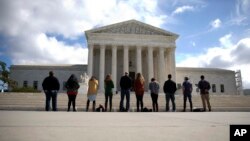The U.S. Supreme Court decided Friday to hear an appeal of a Texas law that, if upheld, would leave the nation's second-largest state with just 10 abortion clinics for 27 million people.
This will be the first abortion case heard by the high court since 2007.
Abortion providers are challenging parts of a Texas law signed in 2013 by Rick Perry, the state's Republican governor at the time. It requires abortion clinics to be set up like costly and sophisticated hospitals and permits doctors to perform abortions only if they are allowed to admit patients to local hospitals.
Nearly every clinic that provides abortions is privately run and relies on financial support from organizations such as Planned Parenthood. They cannot afford the cost of being equipped like a hospital.
Before the law took effect, Texas had 40 abortion clinics. That number is now down to 19. If the Supreme Court upholds the law, nine more would be forced to close.
Texas Attorney General Ken Paxton said the law was passed to protect women's health.
"The advancement of the abortion industry's bottom line shouldn't take precedent over women's health," he said, "and we look forward to demonstrating the validity of these important health and safety requirements in court."
Abortion rights advocates say the law is nothing but an excuse to force clinics to shut down and make it much harder for women to exercise their reproductive rights.
"It would essentially take many women back to a time before abortion was legal," Planned Parenthood President Cecile Richards said Friday. "Texas paints a devastating picture of what's at stake for women across the country, where women are already traveling hundreds of miles, crossing state lines and waiting weeks to get an abortion."
In its landmark Roe vs. Wade decision in 1973, the Supreme Court ruled that abortion is legal. Several challenges to the law have been heard since then.
Abortion rights advocates say the 1973 decision guarantees women a constitutional right to the procedure. They say polls show most Americans support that right.
But abortion opponents, including many religious groups, often protest the procedure they call murder. They have turned to the states to chip away at abortion rights by imposing restrictions and waiting periods, making it harder for a pregnant woman to obtain one.
The Supreme Court plans to hear oral arguments on the Texas law by April 2016 and could hand down its ruling in June.





